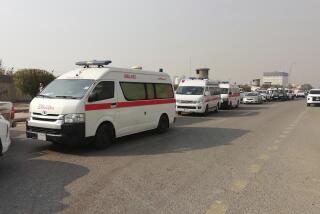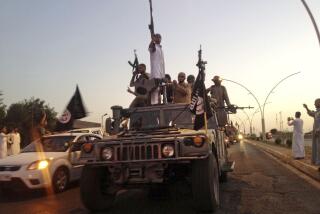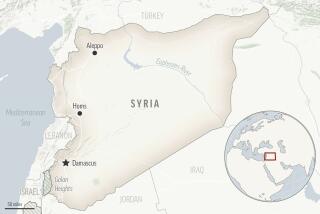U.S. says Al Qaeda in Iraq leader slain
- Share via
BAGHDAD — An Al Qaeda in Iraq leader suspected of executing a Russian official and orchestrating a recent wave of bombings in Baghdad has been killed by U.S. forces in a shootout, the military said Saturday.
Mahir Ahmad Mahmud Zubaydi and his wife were killed Friday when U.S. troops surrounded a building in an attempt to capture him in Baghdad’s Adhamiya neighborhood. Security officials said Zubaydi, also known as Abu Rami, was a leader in the insurgency responsible for near-simultaneous bombings Thursday at two Shiite mosques that killed at least 24 people and injured dozens.
The death of Zubaydi “will send shock waves through Baghdad’s terrorist bombing networks,” spokesman Rear Adm. Patrick Driscoll said in a statement. The military said Zubaydi was responsible for “all terrorist operations” in east Baghdad.
U.S. troops and coalition forces closed in on Zubaydi after receiving tips from insurgents in custody, the statement said. U.S. troops came under fire while trying to arrest him and, “acting in self-defense, coalition forces returned fire, killing Abu Rami and a female,” the statement said.
The U.S. military charged that Zubaydi was a former member of the Sunni Muslim militant group Ansar al Islam and had been responsible for bombings and other attacks in Baghdad for at least two years. He is alleged to have carried out the 2006 kidnappings and executions of four Russian Embassy workers, including one who was videotaped being shot, allegedly by Zubaydi himself.
The mosque bombings last week followed a significant drop in violence and raised concerns among Iraqi and U.S. officials about a possible reprise of sectarian bloodshed from Sunni insurgency groups targeting Shiites.
The U.S. military has tried to ease tensions between the two sects, including the recent American-backed plan for the Iraqi government to absorb as many as 100,000 Sons of Iraq fighters, who are paid by the U.S.
Army Gen. Ray Odierno, the new U.S. commander in Iraq, told reporters in Diwaniya province that coalition forces had made “good inroads inside the network” behind the recent attacks.
“I feel confident that we will continue to go after them and make it very difficult for them to continue,” he said.
--
jeffrey.fleishman @latimes.com
More to Read
Sign up for Essential California
The most important California stories and recommendations in your inbox every morning.
You may occasionally receive promotional content from the Los Angeles Times.














